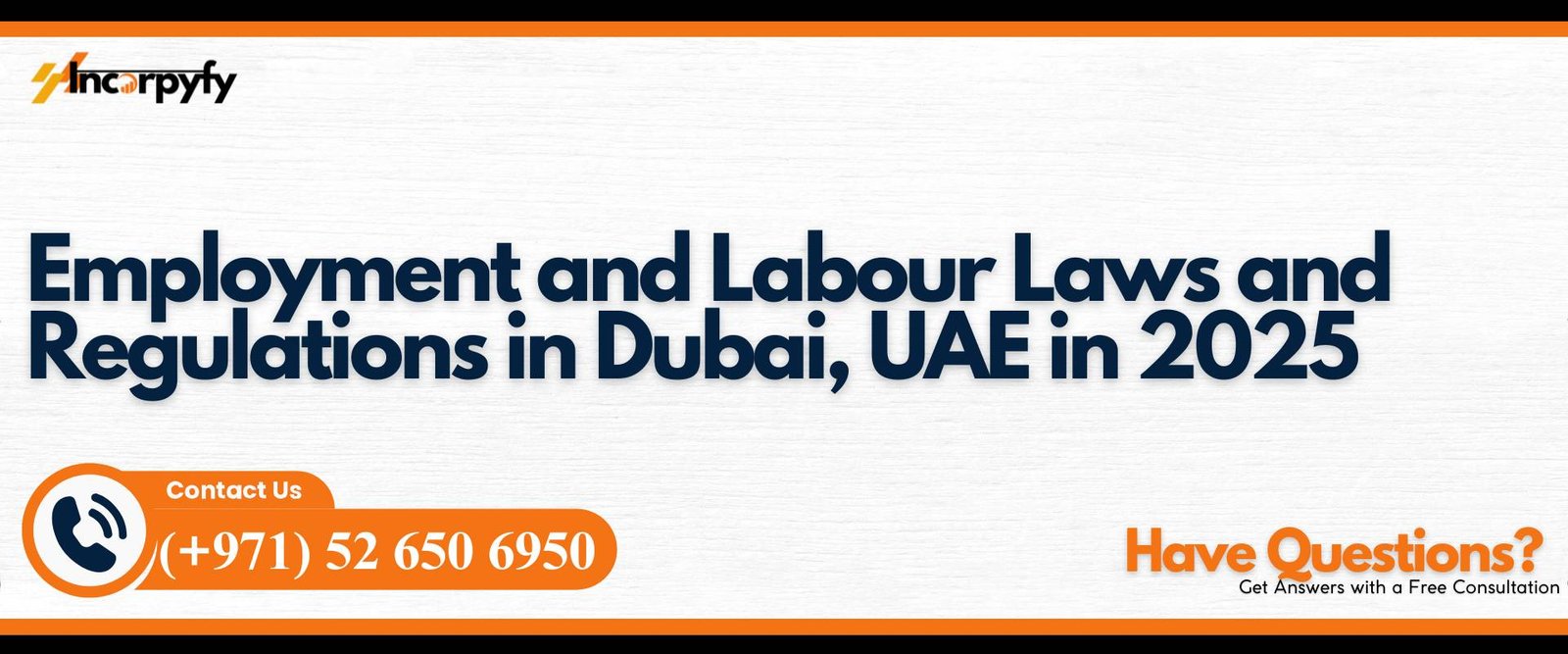
Employment and labour laws in Dubai play a critical role in protecting the rights of both employers and employees. As the UAE continues to modernize its workforce and encourage foreign investment, Dubai’s legal framework continues to evolve. In 2025, updates to labour regulations in Dubai reflect global employment trends while aligning with UAE’s vision for a more inclusive, transparent, and competitive job market.
This comprehensive guide explains all you need to know about Dubai’s employment laws, labour rights, and workplace obligations. Whether you’re a business owner, HR professional, or employee, this article provides a clear understanding of the current labour regulations in Dubai, UAE.
Understanding the Employment Law Framework in Dubai 2025
Dubai’s 2025 labour law framework brings greater clarity and structure to private sector employment. The updated rules aim to balance employer expectations with employee rights, covering contracts, benefits, work ethics, and compliance. All companies must follow these standards to ensure a lawful and fair working environment across all sectors.
Legal Structure of Labour Laws in Dubai
Dubai follows the UAE Federal Labour Law, which applies to all seven Emirates, including Dubai. The Ministry of Human Resources and Emiratisation (MOHRE) oversees the implementation of labour laws in Dubai for the private sector. These laws apply to contracts, wages, working hours, leave entitlements, termination, and more.
Who the Law Applies To
Dubai’s employment laws cover all private-sector employees working in mainland Dubai or free zones. However, some free zones like DIFC and ADGM follow their own employment regulations. Domestic workers are covered under a separate law and not under the main federal framework.
Key Features of Employment Contracts in Dubai
Employment contracts in Dubai outline the legal relationship between employers and workers. In 2025, fixed-term contracts are mandatory, and every agreement must clearly state job roles, salaries, leave, and termination terms. Properly structured contracts reduce disputes and ensure compliance with UAE Labour Law and Dubai’s private sector regulations.
Types of Employment Contracts in Dubai
In 2025, all employment in Dubai must be governed by a fixed-term contract. These contracts clearly mention duration, salary, job title, responsibilities, and termination clauses. Open-ended contracts are no longer used in the private sector.
Mandatory Inclusions in a Dubai Labour Contract
Each contract must include key information such as:
- Name and nationality of employee
- Job title and description
- Salary and compensation
- Working hours and leave
- Notice period and termination conditions
Employment contracts in Dubai must be in Arabic and may be translated into English or other languages if needed.
Working Hours and Overtime Regulations in Dubai
Standard working hours in Dubai are limited to 8 hours per day or 48 hours per week. During Ramadan, hours are reduced. Any additional hours must be compensated with overtime pay. These rules are strictly enforced to protect employee well-being and maintain fair workplace practices in every industry.
Standard Working Hours in the UAE
The law sets a maximum of 8 working hours per day or 48 hours per week. For some sectors like hospitality or security, shifts may be extended to 9 hours a day.
During Ramadan, working hours are reduced by two hours daily for all Muslim and non-Muslim employees.
Overtime Rules in Dubai
If an employee works more than the standard hours, they are entitled to overtime pay. The rate is usually:
- 125% of regular wage for extra hours
- 150% of wage for night work or public holidays
Companies must keep proper records of overtime worked to avoid penalties.
Employee Leave Entitlements in Dubai
Dubai’s updated labour laws offer generous leave policies, including annual leave, maternity leave, and sick leave. Employees earn 30 days of paid vacation annually, while parental leave and public holidays are fully supported. These benefits enhance work-life balance and boost job satisfaction across the city’s diverse workforce.
Annual Leave and Public Holidays
Employees are entitled to 30 days of paid annual leave after one year of continuous service. Those who have completed six months but not a year receive two days of leave per month.
Public holidays in Dubai include Eid, National Day, New Year, and others declared by the government.
Sick Leave and Maternity Leave in Dubai
Employees are entitled to 90 days of sick leave per year—with pay depending on the duration:
- Full pay for first 15 days
- Half pay for next 30 days
- Unpaid for remaining days
Maternity leave in Dubai is 60 days—45 with full pay and 15 with half pay. Paternity leave is five paid working days.
Minimum Wage and Salary Protection in Dubai 2025
Though Dubai has no unified minimum wage, salary standards are monitored across sectors. Employers must pay salaries through the Wages Protection System (WPS), ensuring on-time, traceable payments. This system protects worker rights, prevents wage theft, and supports financial transparency within Dubai’s employment market in 2025.
Minimum Salary Requirements in Dubai
As of 2025, there is no universal minimum wage set across the UAE. However, some sectors or company categories may have agreed salary floors, especially in labour-intensive industries or free zones.
Wages Protection System (WPS)
All companies must pay salaries via the Wages Protection System (WPS) to ensure timely and traceable payments. Failing to comply can lead to fines, suspension of services, or legal action.
Termination, Resignation, and Gratuity Pay in Dubai
When employment ends, Dubai’s laws ensure fair notice, smooth exit procedures, and compensation. Employees who complete a year of service are entitled to end-of-service gratuity. Clear rules exist for resignation and employer-initiated termination, minimizing legal risks and protecting both parties during contract closure.
Employee Resignation Rules
Employees must provide written notice—typically 30 days—before resigning. If the contract is not respected, either party may have to pay compensation equal to the notice period salary.
Termination by Employer
An employer can terminate an employee for valid reasons like poor performance, misconduct, or business closure. However, unfair dismissal can lead to legal consequences.
End of Service Gratuity in Dubai
Employees who complete one year of service are entitled to end-of-service benefits, calculated as:
- 21 days’ basic pay per year for the first 5 years
- 30 days’ basic pay for every additional year
Gratuity is capped at 2 years’ total salary and is not applicable in cases of dismissal due to gross misconduct.
Employee Rights and Protections in Dubai
Every employee in Dubai is protected under anti-discrimination laws and workplace safety regulations. Harassment, unfair treatment, and unsafe conditions are prohibited. Equal pay, ethical work conditions, and respectful conduct are now central to maintaining a productive, inclusive, and legally compliant workplace in Dubai.
Equal Pay and Non-Discrimination
All employees in Dubai have the right to equal pay for equal work, regardless of nationality, gender, religion, or race. Discrimination in the workplace is strictly prohibited.
Workplace Harassment and Safety
Workplace harassment and bullying are criminal offenses. Employers must provide a safe, respectful work environment with adequate health and safety measures, especially in construction, logistics, and manufacturing.
Employment Law for Free Zones in Dubai
Dubai’s free zones operate with slightly different employment rules, especially in areas like DIFC or DMCC. While basic labour rights are maintained, some free zones offer flexible contract terms and leave policies. It’s important to understand which rules apply based on your company’s legal jurisdiction.
DIFC and Other Free Zone Employment Rules
While most free zones follow UAE Labour Law, zones like Dubai International Financial Centre (DIFC) have their own employment regulations that are aligned with international standards.
Key Differences in Free Zones
Free zones offer flexibility in leave policies, contract structures, and dispute resolution. However, basic labour rights—like end-of-service gratuity and working hours—remain protected.
Labour Dispute Resolution and Legal Process
In Dubai, labour disputes are handled first through MOHRE mediation and, if needed, through Labour Courts. Employees and employers can file complaints online or in person. Fast-track legal support ensures fair judgments, promoting trust and transparency in Dubai’s professional relationships and workplace environments.
Filing a Complaint with MOHRE
Employees can lodge complaints through MOHRE via the online portal, call center, or mobile app. The ministry will attempt to resolve the issue amicably first.
Labour Court and Legal Recourse
If no resolution is reached, the matter is referred to the Labour Court. Legal representation is allowed, and the court decides on compensation or other remedies.
Visa, Sponsorship, and Work Permit Regulations in 2025
To work in Dubai, employees need valid visas, work permits, and labour cards. In 2025, Golden Visas and freelancer permits are also available. The sponsorship system remains essential for expats, ensuring lawful hiring and proper documentation for every worker in Dubai’s growing economy.
Labour Card and Work Permit
Before working, every employee must be issued a labour card and work permit. These are managed by MOHRE or the relevant free zone authority and tied to the employer.
Golden Visa and Long-Term Residency for Skilled Workers
Dubai’s Golden Visa program provides long-term residency to skilled professionals, investors, and scientists. In 2025, more professions are eligible, offering job security and independence from traditional sponsorship systems.
Emiratisation and Hiring Local Talent in Dubai
Dubai’s Emiratisation program requires private companies to prioritize hiring UAE nationals. Employers must meet quota targets based on company size and sector. Incentives and penalties encourage compliance, creating new career paths for Emiratis while supporting long-term national workforce development goals.
What is Emiratisation?
Emiratisation is a government initiative to increase the number of UAE nationals in the private sector. Companies must meet specific quotas depending on their industry and size.
Employer Obligations Under Emiratisation
Employers are encouraged to hire, train, and promote UAE nationals. Failure to comply with quotas can result in penalties, bans, or limited access to work permits.
Conclusion
Dubai’s labour law landscape continues to evolve to support fairness, innovation, and business growth. In 2025, employers and employees alike must stay informed of the latest employment regulations, contract changes, and workplace expectations.
Whether you’re managing a company or working in Dubai, understanding these laws protects your rights and helps you navigate responsibilities with confidence. Consulting with experienced legal advisors or HR consultants is always a wise step when dealing with contracts, disputes, or business setup.
If you’re considering expanding your business or managing human resources compliantly, expert guidance on company formation and employment laws is essential.
For comprehensive support in workforce planning, legal structuring, and document compliance, speak with professionals specializing in company formation in Dubai, UAE.
Frequently Asked Questions (FAQs)
What is the current employment contract format in Dubai 2025?
All contracts must now be fixed-term contracts. Open-ended contracts are no longer valid in the private sector.
What is the maximum number of working hours in Dubai per week?
Standard working hours are 8 per day or 48 per week, with reduced hours during Ramadan.
How much end-of-service gratuity is an employee entitled to?
Employees are entitled to 21 days’ pay per year for the first five years and 30 days per year after that.
Can employers terminate contracts without notice?
Contracts can only be terminated with cause and appropriate notice. Unjustified termination may lead to legal consequences.
What is WPS in Dubai labour law?
WPS stands for Wages Protection System. It ensures employees are paid on time and transparently.
Are free zone employment laws different from mainland Dubai?
Yes. Some free zones like DIFC have their own employment regulations, though they maintain many protections under UAE Labour Law.






